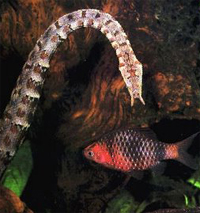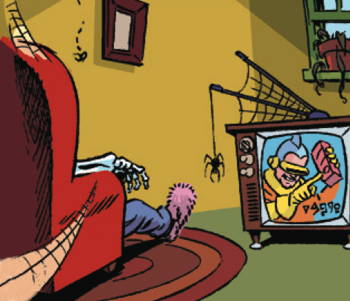July 2009
July 4, 2009
Boy Survives Meteorite Strike
A meteorite hit Gerrit Blank in the hand, leaving a three inch scar. He said "it knocked me flying" and then made a one foot crater in the earth. The blinding flash was his only warning, which was followed by "an enormous bang like a crash of thunder." The schoolboy said the noise made his ears ring for hours afterward.
The pea-sized meteorite has been found to be magnetic, and chemical tests verify it has fallen from space.
Here's the link to the original story:
http://www.telegraph.co.uk/scienceandtechnology/science/space/5511619/14-year-old-hit-by-30000-mph-space-meteorite.html
Posted By: gdanea - Sat Jul 04, 2009 -
Comments (3)
Category: Injuries
Weird Florida: Inglis
The Town of Inglis is famous for 2 things: It was the filming location for the Elvis movie Follow That Dream, and in 2001 the Mayor officially banned Satan.(Chuck may have covered this already, I haven't had time to look through his archives)
Posted By: fyshstyxx - Sat Jul 04, 2009 -
Comments (1)
Category: Armageddon and Apocalypses, Government, Law, Movies, Politics
Naim Süleymanoğlu: The Pocket Hercules
This weightlifter from Turkey stands only 4 feet 10 inches tall, but can lift more than 3 times his bodyweight over his head.
Posted By: fyshstyxx - Sat Jul 04, 2009 -
Comments (1)
Category: Exercise and Fitness, Human Marvels
Banksy Exhibit
Posted By: Paul - Sat Jul 04, 2009 -
Comments (3)
Category: Art, Museums, Europe
Happy Fourth of July!
Posted By: Paul - Sat Jul 04, 2009 -
Comments (2)
Category:
The Weird Sisters
P J Harvey and Bjork onstage together is almost the definition of a weirdness black hole.
Posted By: Paul - Sat Jul 04, 2009 -
Comments (2)
Category: Eccentrics, Bohemians, Beatniks, Hippies and Slackers, Music, Women
July 3, 2009
Sneaky Snakes

Posted By: Nethie - Fri Jul 03, 2009 -
Comments (3)
Category: Animals, Food, Nature, Science
Car Tossing
When too much time meets a creative imagination.At the end, watch for the firebomb.
Posted By: gdanea - Fri Jul 03, 2009 -
Comments (4)
Category: Flight
Weird Britannia!
Time to point our telescopes of weirdness at "the old country", methinks.
And it's not just British brains that are shrinking, the UK's sheep are getting smaller as well. Because of a trend towards milder weather believed to be due to climate change, Sheep on the Outer Hebridean island of Soay are getting smaller at the rate of 100g/year, say researchers from Imperial College, London. Though it might seem that warmer winters and a greater abundance of food might make for bigger sheep, Tim Coulson, the professor leading the study, points out that fewer weaker and smaller lambs will die over winter, bringing down the average size (Telegraph).
Now, in some good news, UK campaigners have won a second victory in a three-year battle... to bring back a chocolate bar. The "Wispa Bar", made by European confectioners Cadbury, was introduced in 1995 along with a caramel laced version called the "Wispa Gold", only for both to be discontinued in 2003. This prompted some die-hard fans of the bubbly chocolate bar to start a petition to have it go into production again, resulting in a "limited edition" run of the original Wispa last year. When the 40 million bars produced sold out in just 18 weeks, Cadbury decided to relaunch the brand. Not satisfied with just one bar, campaigners have kept up the pressure, causing Cadbury to start producing Wispa Golds "for a limited period," as before. However to some commentators, this latest move looks more like slick PR than grassroots victory (Sky News).
More in extended >>
Posted By: Dumbfounded - Fri Jul 03, 2009 -
Comments (5)
Category: Animals, Food, Candy, Law, Judges, Nature, Weather, Political Correctness, Religion, Products
North Korean Beer Commercial
Benny-Hill-stye music, women with barely an inch of flesh showing-- The North Koreans have a lot to learn!
Posted By: Paul - Fri Jul 03, 2009 -
Comments (4)
Category: Business, Advertising, Products, Asia, Alcohol
| Get WU Posts by Email | |
|---|---|

| Who We Are |
|---|
| Alex Boese Alex is the creator and curator of the Museum of Hoaxes. He's also the author of various weird, non-fiction books such as Elephants on Acid. Paul Di Filippo Paul has been paid to put weird ideas into fictional form for over thirty years, in his career as a noted science fiction writer. He has recently begun blogging on many curious topics with three fellow writers at The Inferior 4+1. Chuck Shepherd Chuck is the purveyor of News of the Weird, the syndicated column which for decades has set the gold-standard for reporting on oddities and the bizarre. Our banner was drawn by the legendary underground cartoonist Rick Altergott. Contact Us |

